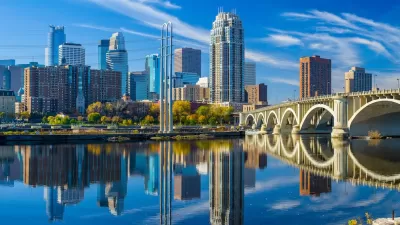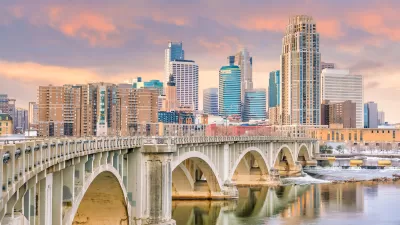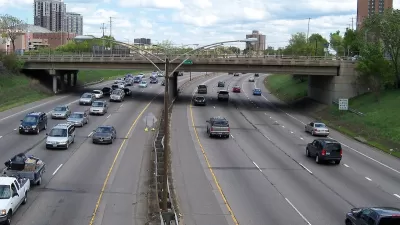John Metcalfe looks at the frightening incidents of violence being directed at bicyclists using Minneapolis' popular Midtown Greenway.
Just this week, Drew Ditlefsen, a 27-year-old delivery man for Peace Coffee was targeted by a Molotov cocktail while riding the trail, reports Metcalfe. "But it's only the latest in a string of attacks on cyclists on the Greenway, an otherwise pleasant 5.5 mile trail for bikers and joggers sited along an old railroad track in south Minneapolis. Wanderers of the scenic byway have been punched, dragged screaming into the woods, had rocks thrown at them, basically everything except set on fire (and it seems the bad guys are working on that)."
Metcalfe provides a brief timeline of the variety of incidents that have occurred since 2007, which include robbery and assault.
"It's not clear if the path is any more dangerous than the city streets. Out of 1.5 million bike trips per year on the Greenway, there are fewer than five assaults on bikers, according to the Midtown Greenway Coalition. The trails are monitored by volunteer patrols and sometimes Minneapolis police in squad cars (some of whom, unfortunately, are yelled at by bikers to get off the trail). The coalition is also pressing the city for additional safety measures, like better lights and more security cameras, and has offered to subsidize Krav Maga classes to bicyclists who want to learn self-defense."
FULL STORY: Minneapolis Bike Riders Targeted With Sticks, Rocks, Molotov Cocktail

Manufactured Crisis: Losing the Nation’s Largest Source of Unsubsidized Affordable Housing
Manufactured housing communities have long been an affordable housing option for millions of people living in the U.S., but that affordability is disappearing rapidly. How did we get here?

Americans May Be Stuck — But Why?
Americans are moving a lot less than they once did, and that is a problem. While Yoni Applebaum, in his highly-publicized article Stuck, gets the reasons badly wrong, it's still important to ask: why are we moving so much less than before?

Using Old Oil and Gas Wells for Green Energy Storage
Penn State researchers have found that repurposing abandoned oil and gas wells for geothermal-assisted compressed-air energy storage can boost efficiency, reduce environmental risks, and support clean energy and job transitions.

Greening Oakland’s School Grounds
With help from community partners like the Trust for Public Land, Oakland Unified School District is turning barren, asphalt-covered schoolyards into vibrant, green spaces that support outdoor learning, play, and student well-being.

California Governor Suspends CEQA Reviews for Utilities in Fire Areas
Utility restoration efforts in areas affected by the January wildfires in Los Angeles will be exempt from environmental regulations to speed up the rebuilding of essential infrastructure.

Native American Communities Prepare to Lead on Environmental Stewardship
In the face of federal threats to public lands and conservation efforts, indigenous groups continue to model nature-centered conservation efforts.
Urban Design for Planners 1: Software Tools
This six-course series explores essential urban design concepts using open source software and equips planners with the tools they need to participate fully in the urban design process.
Planning for Universal Design
Learn the tools for implementing Universal Design in planning regulations.
Heyer Gruel & Associates PA
City of Moreno Valley
Institute for Housing and Urban Development Studies (IHS)
City of Grandview
Harvard GSD Executive Education
Salt Lake City
NYU Wagner Graduate School of Public Service
City of Cambridge, Maryland





























